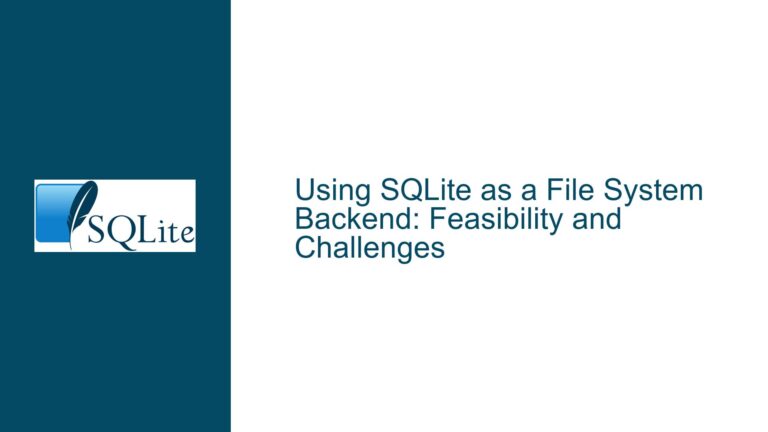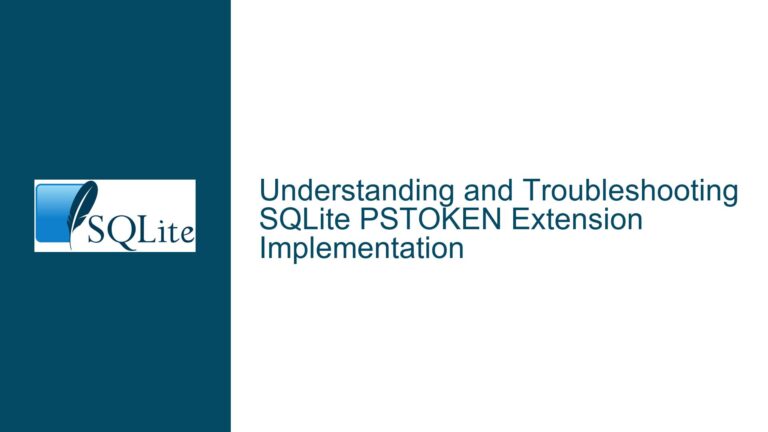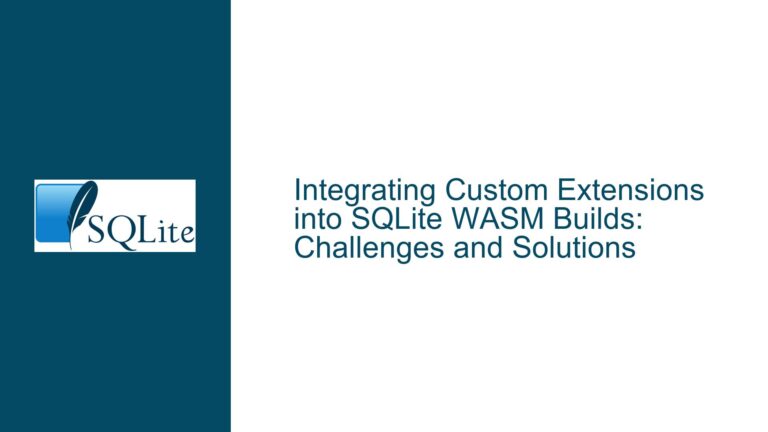Addressing GCC-10 Compiler Warnings in SQLite’s sqlite3SelectNew Function
GCC-10 Warning: Function May Return Address of Local Variable in sqlite3SelectNew
The sqlite3SelectNew function in SQLite is a critical component responsible for allocating and initializing a new Select structure, which is used to represent SQL SELECT statements during query parsing. However, when compiling SQLite with GCC-10, a specific warning arises: warning: function may return address of local variable [-Wreturn-local-addr]. This warning is triggered by the use of a local variable standin within the sqlite3SelectNew function. The warning suggests that the function might return the address of a local variable, which would lead to undefined behavior since local variables are destroyed once the function scope ends. However, in this case, the warning is a false positive due to the careful design of SQLite’s memory management and error-handling mechanisms.
The standin variable is a stack-allocated Select structure used as a fallback when memory allocation fails. Its purpose is to ensure that SQLite can gracefully handle out-of-memory (OOM) conditions without leaking resources or crashing. The function is designed such that the standin variable is never actually returned to the caller. Instead, it is used internally to clean up resources in the event of an OOM error. The warning arises because the GCC-10 compiler cannot fully track the logic that ensures standin is never returned, particularly due to the complexity of the control flow and the use of assertions.
Interrupted Memory Allocation and Resource Cleanup Mechanisms
The primary cause of this warning lies in the interaction between SQLite’s memory allocation logic and the compiler’s inability to fully analyze the control flow. The sqlite3SelectNew function attempts to allocate memory for a new Select structure using sqlite3DbMallocRawNN. If this allocation fails, the function uses the standin variable as a temporary placeholder to hold the substructures (such as pEList, pSrc, pWhere, etc.) that were passed as parameters. This allows the function to call clearSelect, a destructor-like function, to free these substructures and avoid memory leaks.
The standin variable is necessary because, in the event of an OOM error, the function cannot allocate memory for a new Select structure. Using a stack-allocated variable ensures that the function can still perform cleanup operations without relying on additional dynamic memory allocation. However, this design confuses the GCC-10 compiler, which cannot guarantee that the address of standin will not be returned to the caller. The compiler’s static analysis is limited by its inability to track the state of pParse->db->mallocFailed across function calls and its reliance on assertions, which are disabled in non-debug builds (when NDEBUG is defined).
The warning is exacerbated by the fact that SQLite is designed to be highly robust in the face of OOM conditions. This robustness requires careful handling of memory allocation failures, which in turn introduces complexity that the compiler cannot fully analyze. Additionally, the use of assertions to enforce invariants further complicates the compiler’s analysis, as assertions are typically disabled in production builds.
Implementing Compiler Workarounds and Ensuring Thread Safety
To address this warning, a workaround was introduced in SQLite’s source code. The workaround involves adding a pAllocated variable to explicitly track whether the returned Select structure was dynamically allocated or is the standin variable. This change allows the compiler to recognize that the function will never return the address of a local variable, thereby silencing the warning. The modified code looks like this:
SQLITE_PRIVATE Select *sqlite3SelectNew(
Parse *pParse, /* Parsing context */
ExprList *pEList, /* which columns to include in the result */
SrcList *pSrc, /* the FROM clause -- which tables to scan */
Expr *pWhere, /* the WHERE clause */
ExprList *pGroupBy, /* the GROUP BY clause */
Expr *pHaving, /* the HAVING clause */
ExprList *pOrderBy, /* the ORDER BY clause */
u32 selFlags, /* Flag parameters, such as SF_Distinct */
Expr *pLimit /* LIMIT value. NULL means not used */
){
Select *pNew;
Select standin;
int pAllocated = 1; /* Workaround for GCC-10 warning */
pNew = sqlite3DbMallocRawNN(pParse->db, sizeof(*pNew) );
if( pNew==0 ){
assert( pParse->db->mallocFailed );
pNew = &standin;
pAllocated = 0;
}
/* ... rest of the function ... */
assert( pAllocated || pNew!=&standin );
return pNew;
}
This workaround introduces minimal overhead and ensures that the compiler can correctly analyze the control flow. The pAllocated variable explicitly tracks whether pNew points to dynamically allocated memory or the standin variable, allowing the compiler to recognize that the function will never return the address of a local variable.
It is important to note that this workaround does not compromise thread safety. The standin variable must remain a stack-allocated variable because it is used to handle OOM conditions in a thread-safe manner. If standin were declared as a global or static variable, it could lead to race conditions if multiple threads experienced OOM errors simultaneously. The use of a stack-allocated variable ensures that each thread has its own instance of standin, preventing conflicts between threads.
Additionally, the workaround does not significantly impact performance or code size. Measurements using GCC with various optimization levels (-O2, -O3, and -Os) show that the overhead introduced by the workaround is negligible. For example, the size of the compiled binary remains virtually unchanged, and the performance impact is minimal. This makes the workaround a practical solution for silencing the warning without introducing significant drawbacks.
For developers who encounter this warning and cannot immediately apply the workaround, an alternative solution is to disable the specific warning using the -Wno-return-local-addr flag. This can be done by setting the CGO_CFLAGS environment variable when building SQLite with Go:
export CGO_CFLAGS="-g -O2 -Wno-return-local-addr"
This approach is less ideal than applying the workaround, as it suppresses all warnings of this type rather than addressing the root cause. However, it can be a useful temporary measure for developers who need to build SQLite without modifying its source code.
In conclusion, the warning issued by GCC-10 regarding the sqlite3SelectNew function is a false positive resulting from the compiler’s inability to fully analyze SQLite’s robust error-handling mechanisms. The introduction of a pAllocated variable provides an effective workaround that silences the warning without compromising thread safety or performance. This solution has been incorporated into SQLite’s source code, ensuring that future builds will not encounter this warning. For developers using older versions of SQLite, disabling the warning via compiler flags offers a temporary solution. Ultimately, this issue highlights the challenges of balancing robust error handling with compiler optimizations and static analysis.






